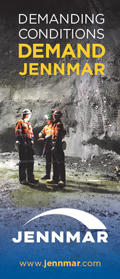 Northern Dynasty Minerals has submitted a 635-page critique of the draft Bristol Bay Watershed Assessment (BBWA) report — entitled An Assessment of Potential Mining Impacts on Salmon Ecosystems of Bristol Bay, Alaska — in response to the US Environmental Protection Agency’s (EPA) call for public comment. Calling the draft BBWA report “seriously flawed, and not grounded in sound scientific analysis,” the Northern Dynasty critique calls upon EPA to cease action on the watershed assessment until such time as the Pebble Limited Partnership (PLP) submits a definitive proposal for the development of the Pebble deposit. Northern Dynasty also criticised the EPA for refusing to extend its 60-day comment period despite calls from the State of Alaska, Alaska Senator Lisa Murkowski and Congressman Don Young, as well as the state’s business and Alaska Native leadership.
Northern Dynasty Minerals has submitted a 635-page critique of the draft Bristol Bay Watershed Assessment (BBWA) report — entitled An Assessment of Potential Mining Impacts on Salmon Ecosystems of Bristol Bay, Alaska — in response to the US Environmental Protection Agency’s (EPA) call for public comment. Calling the draft BBWA report “seriously flawed, and not grounded in sound scientific analysis,” the Northern Dynasty critique calls upon EPA to cease action on the watershed assessment until such time as the Pebble Limited Partnership (PLP) submits a definitive proposal for the development of the Pebble deposit. Northern Dynasty also criticised the EPA for refusing to extend its 60-day comment period despite calls from the State of Alaska, Alaska Senator Lisa Murkowski and Congressman Don Young, as well as the state’s business and Alaska Native leadership.
“With the Bristol Bay Watershed Assessment, the EPA is grossly over-stepping its authority for reviewing major development projects in Alaska and the United States and is doing so in a manner that calls into question the federal agency’s integrity and its technical and scientific credibility,” said Northern Dynasty President & CEO Ron Thiessen. “The authors of this study have clearly been influenced by paid activists and special interest groups to create a report that is more advocacy than science. It is a scientifically flawed, inappropriately timed and politically motivated document, and it should be an embarrassment to the intelligence and integrity of the many good and devoted scientists within EPA.”
Thiessen said there is no sound policy or scientific reason for the EPA to continue to rush its study forward, ignoring the appeals of Alaska Native, business and political leaders and its own guidelines for undertaking scientific studies in the public interest. He said Northern Dynasty’s comprehensive technical, engineering and environmental critique of the draft BBWA report makes it abundantly clear it is a fundamentally flawed study that should in no way determine the future of America’s most important mineral resource.
“In addition to its technical and scientific deficiencies, the draft BBWA report is inappropriate because it attempts to usurp the regulatory authority of the State of Alaska and the US Army Corps of Engineers by pre-judging the Pebble project before it has been fully designed or submitted for permitting under the National Environmental Policy Act (NEPA),” Thiessen said. “Any regulatory action based on this flawed watershed assessment will ultimately be challenged by the government, Alaska Native and business entities that have questioned the authority of the EPA and the scientific integrity of the draft BBWA report.”
Northern Dynasty submitted its comments on the EPA’s draft watershed assessment on behalf of its shareholders, some three-quarters of whom are American citizens. Noting that Pebble is located on State of Alaska lands designated for mineral exploration and development, Thiessen said Northern Dynasty shareholders fully expect the Pebble project to be evaluated by state and federal regulators within the NEPA permitting process, like every other major development project in the US.
Evidence provided in Northern Dynasty’s submission to the EPA demonstrates that:
- The draft assessment employs a flawed risk and impact assessment methodology, and fails to meet the EPA’s own guidelines for such studies
- The draft assessment presents numerous, serious errors of fact and omission
- The draft assessment uses wholly inappropriate case studies, comparing the future environmental performance of the Pebble Project to mines built in the 1800s and in foreign countries like Romania, rather than modern mines in the US
- The draft assessment fails to consider reliable and comprehensive sources of data, and specifically overlooks the more than $120 million in environmental studies summarised in PLP’s Environmental Baseline Document (EBD), which represents the most exhaustive and comprehensive data set available in the region
- The draft assessment presents a selective and misleading analysis of the Bristol Bay economy, and entirely fails to consider the positive benefits that responsible mineral development could deliver to a region suffering from significant out-migration, high unemployment and one of the highest costs of living in the US
- The draft assessment has been rushed, evaluating a region of some 51,800 km2 in little over a year where previous watershed studies have taken many years to evaluate much smaller land areasThe draft assessment is inappropriate because it seeks to evaluate the effects of a project before it has been proposed, and before site-specific mitigation for potential environmental effects are known
- The draft assessment evaluates the potential effects of a “hypothetical mine scenario” as determined by the EPA, even though this scenario could not be permitted under federal and state law.










